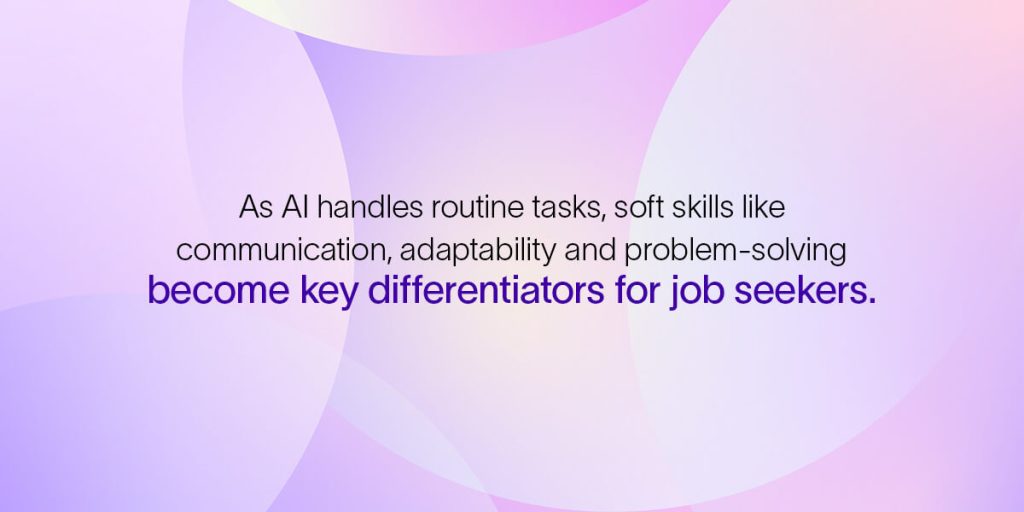As 2024 comes to an end, the job market continues to change. These changes will define how employers choose candidates and how candidates apply for positions. Job seekers can stay up to date, feel better prepared and improve their chances of landing their dream job by researching the emerging trends in the job market.
For those new to the working landscape and those considering a job switch, consider the following 2025 job market trends. Job seekers can use these insights and tips to start preparing for the job market in 2025.
1. AI and Technology Advancements
Artificial intelligence (AI) and automation already play integral roles in numerous industries. Companies use AI to complete simple tasks, such as generating reports, or complex ones, such as assisting in surgeries. Many jobs use AI and automation in one way or another.
These technological advancements aim to increase efficiency, and businesses continue to adopt them. In fact, the United States Bureau of Labor Statistics (BLS) estimates computer and IT jobs will grow significantly faster than other occupations between 2023 and 2033. The increased adoption of AI will likely give rise to IT jobs related to cloud computing, cybersecurity and data science.
Practical tip: Job seekers interested in tech must act now. Before the year ends, upskill in AI, data analytics and other related topics to capitalize on this trend.
2. Evolving Employment Landscape
According to Economist Intelligence, the U.S. unemployment rate may fluctuate in 2025. Some industries will need to adapt due to digital transformations, and this evolution creates exciting opportunities in sectors like IT and health care. The emergence of digital developments may also lead to an increase in roles like data scientists.
Practical tip: Applicants can research in-demand jobs with long-term growth potential. Another strategy involves seeking employers who offer apprenticeships or internship programs. These programs provide an opportunity to gain firsthand experience and a better chance of becoming fully employed.
3. Fewer Hybrid and Remote Work Models
Since 2020, the meaning of “workplace” has shifted drastically. During and immediately after the pandemic, hybrid and remote work models became the norm in many industries. A few years later, the work model slowly shifted again. In 2025, some companies will likely transition away from remote and hybrid models to prioritize in-person positions.
Practical tip: Job seekers can take this opportunity to develop strong remote and in-person communication skills. They must learn how to work with people and autonomously. A varied skill set can help applicants look more attractive and adaptable.
4. Greater Emphasis on Soft Skills

As AI and automation facilitate manual and routine tasks, employers will place more value on employees’ soft skills. Some of the most in-demand skills include communication, adaptability, problem-solving and leadership. While technical skills can change with technological advancements, soft skills remain relevant forever.
Practical tip: Applicants should learn and continue to refine their soft skills. However, they must also stay up to date with their technical skills to stand out in a competitive job market.
5. More Green Jobs
The green economy could create 100 million new jobs by 2030. Key drivers of growth include increasing concerns about climate change, environmental protection and sustainable living. As more companies integrate eco-friendly practices, more green jobs — including those in renewable energy, waste management and sustainability consulting — enter the picture. Even roles like urban planners and architects want to create sustainable communities.
Practical tip: Job seekers can upskill in areas like environmental science, green tech or sustainability certifications. They can highlight any eco-related volunteer work or projects in their resumes to appeal to companies looking for people passionate about sustainability initiatives.
6. Gig Economy Growth
Recent job market trends show expansion in the gig economy. This avenue provides job seekers with more flexible opportunities to work as freelancers or contractors. Whether they need graphic design, writing, coding or even consulting services, many companies hire for project-based work instead of traditional full-time roles. This trend offers freedom and the ability to diversify income streams, but it also requires solid self-management skills.
Practical tips: Job applicants must develop a solid online presence — whether through a portfolio website or a professional profile on platforms like Upwork or Fiverr. Candidates must focus on honing their skills and gathering testimonials to help them stand out in the gig economy.
7. Rise of Human-Centric Leadership
As AI takes on more of an organization’s routine tasks, leadership roles transform in exciting ways. In 2025, companies will place more emphasis on building strong, connected teams that can thrive alongside technology. Leaders who show empathy, encourage collaboration and prioritize personal growth become indispensable as companies seek to balance innovation with genuine human connection.
Practical tip: Aspiring company leaders can get ahead by focusing on emotional intelligence and team-building skills. Leadership training or mentorship programs can help provide valuable experience. Candidates can make themselves more attractive in a world that values tech-savviness and the human touch.
Start Your Career at Danaher
These job market trends bring exciting opportunities for those who remain prepared. From the rise of AI and automation to the expansion of the gig economy, the job market trends for 2025 will create new paths for job seekers. The growth in sustainability and DEI initiatives, along with the booming health and wellness industry, means exciting opportunities for everyone — whether you are seeking your first job or switching careers.
At Danaher, we embrace these trends. With innovative roles in life sciences, diagnostics and biotechnology, we offer more than a job — we offer a career. Check out Danaher’s job openings, and take your next step in a forward-thinking environment that shapes the future of science and technology.


Comments
One response to “7 Job Market Trends to Monitor in 2025”
[…] becoming the secret sauce for success. Why? As undetectable AI and automation handle routine tasks, skills like communication, adaptability, and leadership stand out. Did you know 92% of hiring professionals value these soft […]